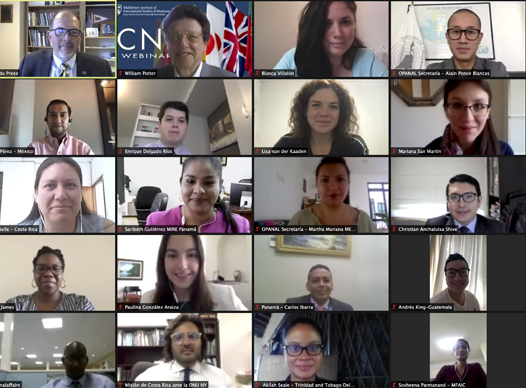July 28, 2020
Jean du Preez
The 7th Disarmament and Nonproliferation Summer School for Latin American and Caribbean diplomats jointly organized by CNS in partnership with the Mexican Foreign Ministry, the agency for the Prohibition of Nuclear Weapons in Latin American and the Caribbean (OPANAL) and the Matías Romero Institute in Mexico City, was held in a virtual format from 28 June – 9 July 2021. In view of the ongoing COVID-19 pandemic. This was the second virtual course following 5 previous courses that have been held in Mexico City since 2014. The course gathered more than 30 junior to mid-level diplomats from 16 countries in the region (with a majority of women participants) as well as 35 experts speakers and panelists from all over the world.

The 2021 course covered the full spectrum of nuclear disarmament, arms control, and nonproliferation, and offered participants the opportunity to learn from top experts in the field. A combination of short lectures and interactive panel discussions focused on the following topics.
Topics
- Proliferation challenges and nonproliferation opportunities
- Technical aspects involved nuclear energy and nuclear weapons
- Motivations for nuclear weapon acquisition; nuclear non-proliferation and disarmament and international law, the threat of nuclear terrorism
- The role of the United Nations and the IAEA, as well as treaties such as the Treaty on the Nonproliferation of Nuclear Weapons (NPT), the Comprehensive Nuclear-Test-Ban Treaty (CTBT), the Treaty on the Prohibition of Nuclear Weapons (TPNW), the Treaty of Tlatelolco and other nuclear weapons free zone treaties
- The status of arms control between the United States and Russia
- Proliferation challenges presented by Iran and North Korea
- New tools and approaches for non-proliferation and disarmament verification and monitoring
One participant pointed out that the scope of the course allowed her, as someone without any knowledge of the subject, “to handle a level of information broad enough to start research work and to use all the tools for my diplomatic career.” Another observed that the course offered “a wider understanding of the main issues regarding non-proliferation and disarmament, which will be very helpful on my opinions on international law related to these topics.”
Interactive Panels and Lectures
A number of interactive panels were interspersed with the series of lectures during the course. The discussion on the “Challenges and Priorities for the Tenth NPT Review Conference” featured a spirited exchange between Dr. William C. Potter (CNS Director and Middlebury Institute Professor), Ambassador Robert Einhorn (Senior Fellow at Center for Security, Strategy, and Technology, Arms Control and Non-Proliferation Initiative) and Ms. Claudia García Guiza, from the Weapons of Mass Destruction Branch, United Nations Office for Disarmament Affairs (UNODA).
An interesting and unique panel discussion on the TPNW, and the activities leading up to the negations of the Treaty, was prefaced by a testimony transmitted live from Tokyo by Ms. Masako Wada, a survivor of the atomic bombing of Nagasaki. The ensuing panel discussion featured key individuals in the TPNW; Ambassador Elayne Whyte Gomez (former Permanent Representative of Costa Rica to the United Nations in Geneva who presided over the Treaty negotiations), Ambassador Alexander Kmentt (Director of the Disarmament, Arms Control and Nonproliferation Department at the Austrian Foreign Ministry and President-designate of First Meeting of State parties to the TPNW); Dr. Rebecca Gibbons (Assistant Professor of Political Science, University of Southern Maine/Belfer Center for Science and International Affairs, Harvard Kennedy School) and Ms. María Antonieta (Toni) Jáquez Huacuja, (Counsellor and Political Coordinator at the Mission of Mexico to the United Nations).
Despite the virtual nature of the course, participants were offered several interactive opportunities to discuss the most pressing challenges to the nuclear disarmament and nonproliferation regime with the assistance of expert moderators. These interactive breakout sessions culminated in a panel discussion on the last day of the course featuring 4 panelists selected by the course participants. Based on discussions within their respective groups, the panel identified a number of key nonproliferation and disarmament challenges and ways to address them.
The course concluded on 9 July with a virtual certificate ceremony and short remarks by Dr. Alejandro Alday González (Director General of Matías Romero Institute); Ambassador Flávio Roberto Bonzanini (Secretary General of OPANAL), Dr. Eduardo Jaramillo Navarrete (Director General for the United Nations, Secretariat of Foreign Affairs of Mexico) and Dr. William Potter (CNS Director).
Responding to the question on whether the course met expectations, one participant observed “Completely. I signed up for this program with a very open mind and was able to honestly change my mind on this topic and allow myself to stop thinking of it as a distant problematic. I now better understand the great responsibility that LAC countries have as a region and to honor its pioneering approach to this end.”
About
The co-organizers plan to offer the Eighth Disarmament and Nonproliferation Summer School for Latin American and Caribbean diplomats in Mexico City from July 11-15, 2022. For information on the Summer School please contact Jean du Preez at [email protected].
